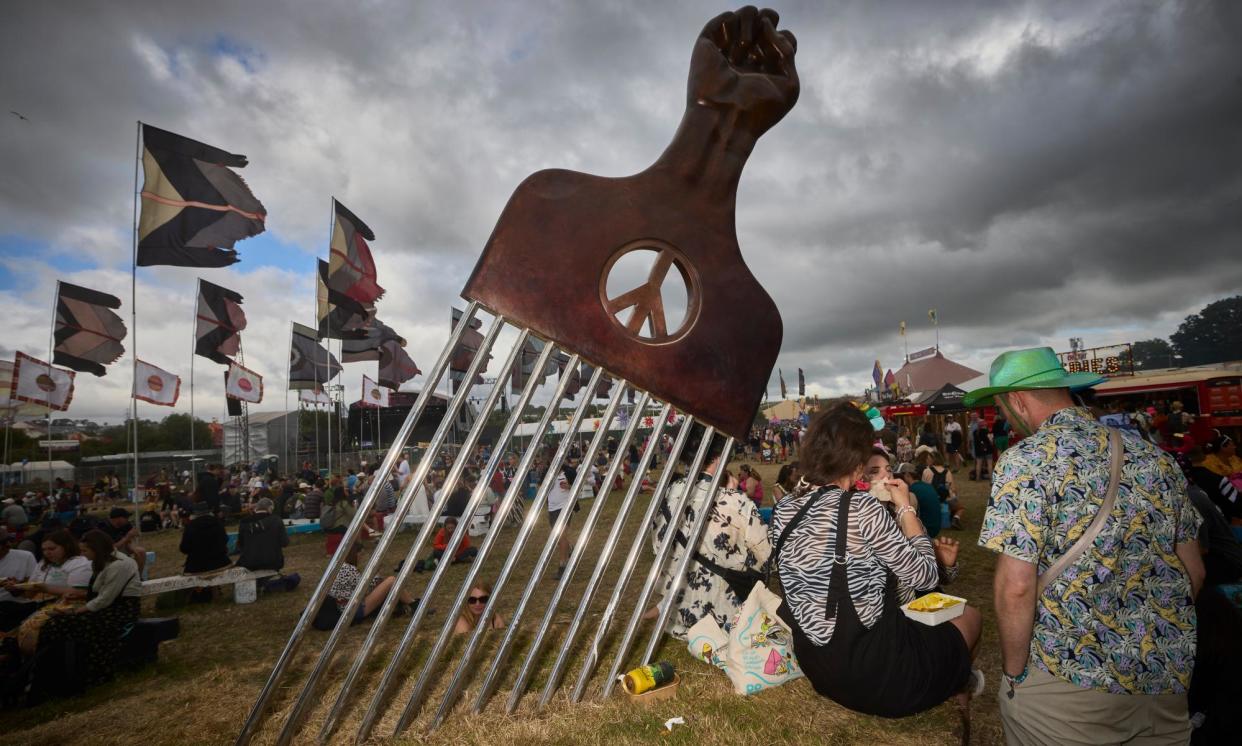Increase in Black artists on Glasto bill reflects cultural shift

As Ron Timehin wandered around Glastonbury’s West Holts stage, something caught his eye: a huge gleaming statue of an afro comb with a clenched fist shooting out of the ground.
“That caught me off guard,” says the photographer from south London, who was at the festival for the first time. “I have the exact same one in my pocket.”
This year, there are signs that efforts are being made to make Glastonbury – which for years has been synonymous with almost entirely white crowds – more appealing to those who may have traditionally not felt catered for on Worthy Farm.
It is not just statues either: the lineup is packed with Black artists, right across the event. Janelle Monáe, Danny Brown, Burna Boy, Tems, Ayra Starr, Moonchild Sanelly, Femi Kuti and Jalen Ngonda all feature, while Little Simz, Michael Kiwanuka and Olivia Dean have prominent Pyramid slots. On Sunday, SZA will become the second Black woman to headline the Pyramid, following Beyoncé’s appearance in 2011.
Glastonbury has always featured Black artists – from Curtis Mayfield, Aswad and Fela Kuti in the 1970s and 80s, to Stormzy and Kendrick Lamar as headliners more recently – but the depth of talent in 2024 feels significant.
“Last year I saw Lizzo but I couldn’t tell you the other headliners, while this year there’s SZA, there’s Burna Boy. The lineup excited me so much more this year,” says Dot Edgar from Manchester, who was attending for the second time. “I’m noticing the cultural shift, in terms of the perceptions of Glastonbury.”
People have been calling for a change for some time. In 2022, Lenny Henry criticised the lack of diversity at Glastonbury, saying he watched the event and did “not see any Black people there”.
Loo How, who has been coming to Glastonbury since 1981, said there are still low numbers of Black attenders but perceptions were changing, slowly.
“There are very few Black people here who are consumers,” she said. “But you’re seeing more Black artists like SZA, Beyoncé, Burna Boy … the list goes on, which is fabulous, but we also need Black people inside the infrastructure of the festival.”
Eljay Briss, a photographer from Bristol, agrees. “When I go to the press tent, everyone is middle-aged, everyone is English; walking in, I’m the only one in there,” he said. “My aim would be to bring a collective; a big team of people from different backgrounds.”
Glastonbury’s diversity statement claims the event strives to create “a culturally rich, inclusive and accepting world”, but some Black attenders have felt uncomfortable at times.
Jazpa, who works for the production team that runs Silver Hayes and has actively tried to increase the number of ethnically diverse workers at the event, said he has sometimes experienced ignorant attitudes. “I will get approached by white people who will ask me if I’ve got drugs to sell, or if I’m performing or for directions. When I tell them I’m part of the management team, it surprises them.”
Related: Can Marina Abramović get Glastonbury to be silent for seven minutes?
Yelena from Bristol says she is an “anomaly” among many Black festival attenders because she has been coming to events such as Glastonbury since she was a child. For her there are still some psychological barriers Black festivalgoers need to overcome. “It’s not just the music, it’s the cultural differences, too. My Black family don’t know what camping is … or you’re coming to a festival and no one in your family has ever been to one before.”
This year there has been a highly successful Black at Glasto WhatsApp group, where attenders share lineup choices, food options and tips for having a good festival.
The chat was developed by creative development organisation ourppls and has more than 200 members, including artists, music executives and punters.
The co-creator of the platform, Elsie Ayotunde Cullen, said: “We’ve had an incredible response from our community and it’s been amazing to see so many opportunities shared also, from photographers being hired to others offering emergency hair styling.”
Yelena says that kind of organic support has helped first-timers and those who have been coming for a while feel more at ease. “This is my favourite place in the world and the more beautiful Black faces I see here year on year brings me so much joy,” she says.

 Yahoo News
Yahoo News 
